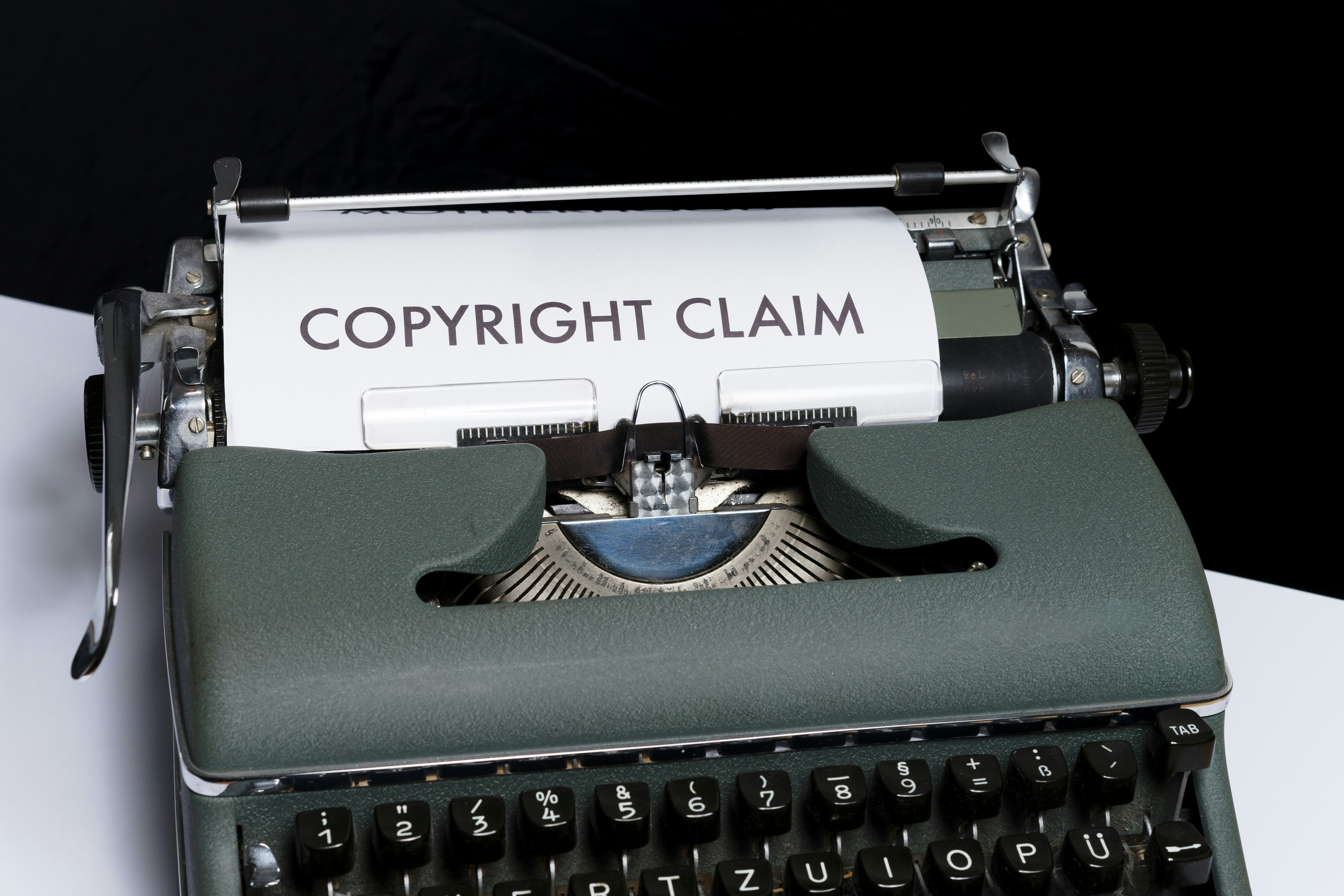Navigating Copyright Protection When Hiring a Ghostwriter
TABLE OF CONTENTS

Ghostwriting, an intriguing yet often misunderstood process, highlights the fascinating intersection of creativity, authorship, and copyright law. In this article, we'll delve into the world of ghostwriting, debunking common myths and unveiling the reality of its legality. We'll also provide you a simplified understanding of copyright protection - distilling complex legal jargon into digestible insights.
Not stopping at that, we're going to take a closer look at the ins and outs of copyright as it pertains to ghostwriting. From revealing who actually owns what to discussing the common copyright concerns, we'll provide you a detailed landscape of the ghostwriting industry.
Shifting gears, we'll walk you through the key elements of a ghostwriting contract; because, understanding how to protect one’s rights is as important as creating compelling content. Finally, we'll talk about the value of ghostwriting services and how they marry quality and legal protection to offer a significant advantage.
So, get ready for a comprehensive guide that illuminates the technicalities of hiring a ghostwriter, making it a transparent and beneficial process.

Is Ghostwriting Legal?
Let's talk some necessary straight facts. There's a hefty dose of misinformation floating around about the legality of ghostwriting, creating a fog of misconception. It's high time to blow that fog away - ghostwriting is legal, no ifs or buts. We even have a guide on debunking the common myths to hiring a ghostwriter.
What Does Ghostwriting Services Cover?
Now, ghostwriting isn't just tucked away in some secretive closet. It's staring right at you from various industries like publishing, music, and marketing.
That best-selling autobiography you can't put down? Possibly ghostwritten. In many traditional publishing houses, 70% of the books they publish are ghostwritten. That chart-topping pop ballad you can't help but croon to? High chances it was penned by a ghostwriter. The fresh and engaging marketing content you recently admired? You guessed it - possibly the work of a skilled ghostwriter.
The fact of the matter is, ghostwriting is far from being a shady, underground operation. It's a perfectly legal and widely practiced professional service, just like any other. The main issue that often fuels misconceptions is one of copyright, ownership, and intellectual property.
But once you pull that apart and really understand it, you'll find that there's nothing complicated or even remotely illegal about hiring someone to navigate the realm of words for you. Spoiler alert: the devil is indeed in the detail of the contract.
Copyright Protection: A Simplified Understanding
Copyright protection is a complex subject that can seem technical, but understanding it is vital for anyone contemplating hiring ghostwriting services.
At its core, copyright protection is a legal right that safeguards the expression of an idea – not the idea itself. It gives the owner, usually the creator of the original work, the exclusive right to use, reproduce, and distribute the work. The purpose of this protection is to encourage creativity and intellectual activity by affording creators the control over their creations and potentially benefit from their work.
Copyright in Writing
Copyright is automatically established once an original work is created and fixed in a tangible medium, like when it's written on paper or saved on a hard drive. So essentially, as soon as a writer types out the last full stop, a set of rights springs into effect.
What's important to understand here is that while not mandatory, registering copyright is beneficial, as it establishes public record of the copyright claim and is necessary if one wishes to sue for copyright infringement.
Translating these copyright tenets to the realm of written content, the author usually is the original copyright holder, having the exclusive rights to reproduce, distribute, publicly perform, and adapt the work, among others. These rights encompass all forms such as articles, books, emails, blogs, and scripts. Protectable elements include everything from the actual words on the page and the structure of the writings to even characters in a story.
At the end of the day, copyright protection is paramount because it enables authors to prevent unauthorized use of their work, which is a key concern, especially in ghostwriting projects.
As we'll see in the next section, in the world of ghostwriting, these rights can virtually always be assigned to another party – which is usually the client. Understanding this copyright nuance goes a long way in ensuring you navigate your ghostwriting endeavors seamlessly.

Ghostwriting And Copyright: Who Owns What?
When it comes to ghostwriting and copyright, things can become a little muddied. Typically, however, the process is straightforward: copyright generally transfers to the person or entity that hires the ghostwriter. This person or entity, typically referred to as the 'client,' will own the copyright to the end product, be it a blog post, book, or song lyrics.
This arrangement stems from the unique nature of ghostwriting. Unlike traditional authors who publish under their own names, ghostwriters willingly surrender the right to public recognition for their work. This is how employing a ghostwriting service has been a tried-and-true formula for business success.
From a copyright perspective, this means ghostwriters are creating works 'made for hire,' and the hiring party is recognized as the legal author from inception, retaining exclusive rights to distribute, reproduce, and adapt the content.
NDAs and Transfers of Rights
However, the ghostwriting industry isn't without its complexities. Copyright concerns are not uncommon and include issues around anonymous authors and non-disclosure agreements (NDAs). An NDA, for instance, can bind a ghostwriter to total secrecy, legally obligating them to deny any involvement with the project.
Another common concern is the transfer of rights. While copyright normally defaults to the 'client', this transfer should ideally be unequivocally stated in a written agreement to avoid future disputes. The absence of such explicit language can lead to cases where ghostwriters may maintain legal ownership, as they are the original creators.
By understanding these specifics, both clients and ghostwriters can navigate the industry more effectively. It helps protect the client's interests while ensuring ghostwriters appreciate the intricacies of their role and the legal implications of their work. With this understanding, they can ensure every agreement upholds their mutual understanding and prevents unanticipated surprises down the road.
Key Elements of a Ghostwriting Contract
For a successful, mutually beneficial relationship between a ghostwriter and a client, a well-structured contract plays a key role. This contract ensures both parties understand their rights and obligations. So what should this contract include?
1. Scope of Work
This is the backbone of the contract. It outlines exactly what will be delivered, including:
The number of words
Format
Other specifics related to the work required
2. Deadlines
These are the specific date or dates by which the writer is expected to deliver the work. It's essential that both parties agree on this timeline to maintain workflow efficiency.
3. Payment Terms
This section includes all the financial details, such as:
How much the ghostwriter will be paid
Payment timings and methods
Form of payment (e.g., upfront, installments, upon completion)
4. Copyright Ownership
One of the most critical aspects of a ghostwriting contract is clearly stating that all copyrights for the produced work will be transferred to the client upon full payment. This ensures the client holds exclusive rights to the work, including the right to modify, distribute, and sell it.
5. Confidentiality or Non-Disclosure Agreement (NDA)
An NDA protects the client's idea or even their identity by prohibiting the ghostwriter from revealing any confidential information related to the work.
6. Termination Clause
This provides information about the circumstances under which the contract can be ended. It ensures safety for both parties involved should things not go as planned.
In the context of ghostwriting, the importance of clear and explicit clauses regarding copyright transfer cannot be emphasized enough. A well-defined transfer of rights anoints the professional relationship with clarity and avoids misunderstandings. It's best to involve a legal expert to ensure all terms are well-defined and protect the interests of both parties.
View contracts as insurance policies, rather than a hurdle. They ensure your smooth journey in the world of ghostwriting.

The Value of Ghostwriting Services
While ghostwriting may bring with it its own legal complexities and considerations, particularly around copyright, it's also important to remember the benefits an accomplished ghostwriter can bring to a project.
Guaranteed Expertise
So why hire a ghostwriting service in the first place? Essentially, it comes down to professional expertise and efficiency. Ghostwriters offer skilled writing expertise and the ability to articulate your ideas clearly and convincingly. They have the ability to take your story, vision, or idea and sculpt it into a well-crafted piece of writing that effectively communicates the desired message to your audience.
Whether it's a novel, an autobiography, marketing material, or a blog post, their professional touch can significantly elevate the quality of your content.
Value of Time
Time is another crucial factor. Ghostwriting services allow you to delegate the task of writing, enabling you to focus on other aspects of your work. Moreover, ghostwriters can often deliver high-quality writing in a shorter time frame than you might be able to achieve yourself, especially if writing is not your main skillset or passion.
You Own the Work
Furthermore, in the context of copyright, hiring a professional ghostwriter ensures that all legality aspects are handled more effectively. A credible ghostwriting service understands the importance of copyrights and will ensure that all work produced is original and free from plagiarism.
This protects you and your work from any potential legal troubles down the line. The predetermined copyright agreement also saves you the trouble of negotiating content rights.
In short, the services of a ghostwriter combine expertise, time-efficiency, and legal peace of mind. Hiring one not only entrusts the creation of quality content to a professional but also circumvents potential legal issues related to copyright.
The value here is evident: you receive top-notch, original content, peace of mind about copyright ownership, and more time to focus on your core business or creative pursuits — a powerful combination that makes hiring a professional ghostwriter a smart investment.
Recap
As we've zigzagged our way through this labyrinth of ghostwriting and copyright protection, we've uncovered a few crucial nuggets of information. Ghostwriting is not only a legal practice but it's also thriving across a variety of industries from publishing, music, to marketing. The foundation of this legality, well, my friend, that's the good old copyright protection.
Copyright isn't just a fancy legal term thrown around in artists' circles. It is a tangible representation of the sweat-and-blood labors of creators, a safety blanket that wraps around their creative brainchild. And when it comes to ghostwriters, it changes hands as smoothly as a baton in a relay race, from ghostwriter to their employer, all thanks to well-drafted contracts.
Ah, contracts. Those critical fixings to any successful ghostwriting feast. They detail every morsel of rights transfers, copyright ownership inclusion, and the likes—an unambiguous roadmap to avoid any nasty bumps down the road.
And now, the cherry on top—hiring a skilled ghostwriter. Nothing bejewels your creative crown brighter than hiring a professional craftsman who understands the luminosity of copyright protection. Their proficiency goes beyond delivering quality content—it's about providing you with peace of mind.
In Conclusion
So, before diving headfirst into the ghostwriting universe, equip yourself with this knowledge. Remember the importance of clearly defining copyright ownership and don't overlook the benefits of entrusting your novel ideas (or other projects) to a seasoned ghostwriter.
It's not just about getting the job done. This is about composing content while ensuring its rightful protection, and ultimately, your protection. Now that's a winning score in anyone's book, wouldn't you say?
1SecondCopy
We hired the top 1% of writers so you don't have to. Get high quality articles & posts in just 3 days.